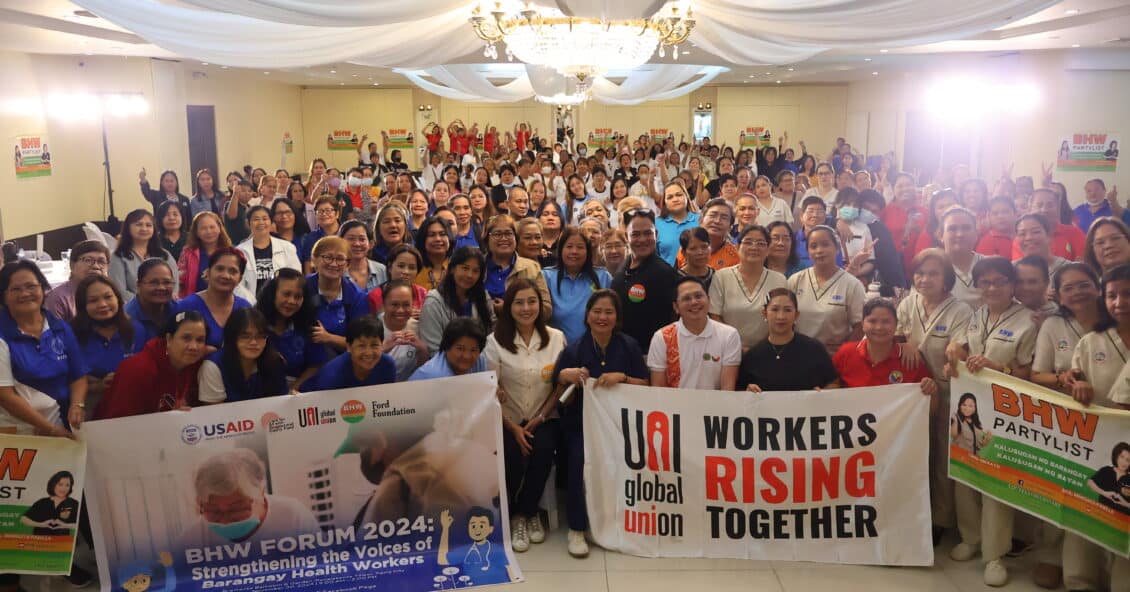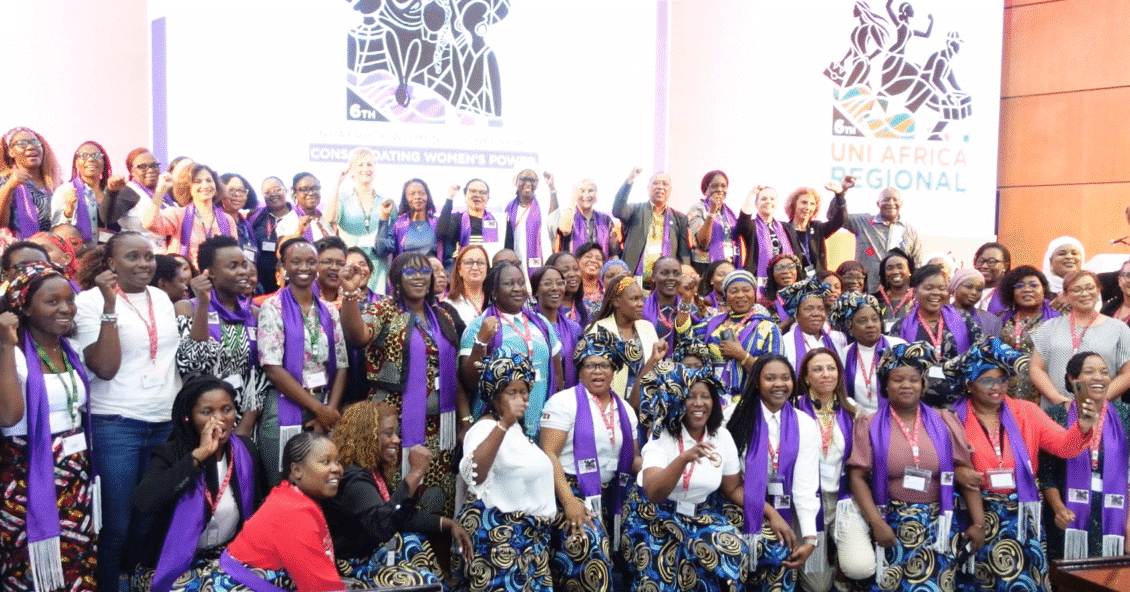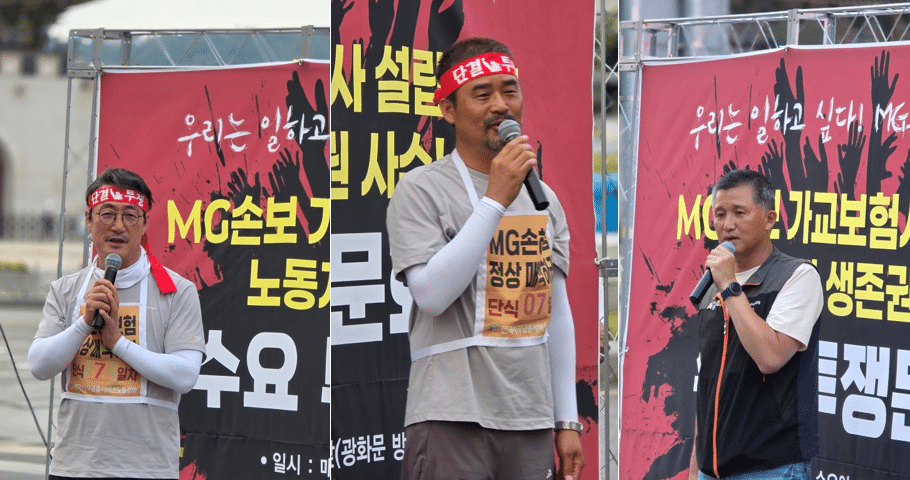Philippines: Community Health Workers & Policymakers Unite in Groundbreaking Forum to Tackle Sectoral Challenges
18.12.24
The UNI Global Union – Philippine Liaison Council (UNI-PLC), in partnership with the BHW Party-list from the House of Representatives, recently held the inaugural BHW Forum 2024: Strengthening the Voices of Barangay Health Workers in Pasig City, Philippines. The event brought together over 250 barangay health workers (BHWs), policymakers, government officials, and key stakeholders to address the pressing issues affecting these essential frontline workers.
Myrna Gaite, President of the Barangay Health Workers Federation of the National Capital Region, underscored the persistent challenges BHWs face: low compensation, lack of job security and social benefits, political persecution, and overwhelming workloads. One of the most urgent issues raised was the delayed payments of the Health Emergency Allowance (HEA), the government-subsidized hazard pay for frontline workers during the COVID-19 pandemic, which many BHWs are still awaiting.
“In our consultation with 121 municipalities and cities across five regions in the country, representing over 33,126 BHWs, the average arrears of HEA amounts to 17 months out of 25, totaling approximately 3.4 billion pesos. Alarmingly, 79 localities—65% of those surveyed—have yet to receive even a single month of their HEA,” reported Gaite. She further emphasized that the HEA, designed to provide crucial support during health crises, has failed to reach its intended beneficiaries nearly two years after the public health emergency was lifted in the Philippines. The situation in other regions remains equally concerning, raising questions about equitable access to these benefits.
Department of Health Administrative IV Director Roderick Napulan provided updates, clarifying that the agency has already allocated 100% of the remaining 27 billion pesos received from the Department of Budget and Management for the HEA. However, BHWs pointed out bottlenecks at the local government unit (LGU) level, where city and municipal health officers excluded BHWs from beneficiary lists or struggled to comply with agency guidelines. “Our office is ready to investigate and take appropriate measures against non-compliant LGUs,” said Napulan, who also assured the agency’s openness to dialogue with BHWs.
“We will file a resolution inquiring about the distribution of HEA in Congress,” promised Rep. Angelica Natasha Co of the BHW Party-list. She added, “Municipal and city health officers, along with relevant government agencies, will be summoned to clarify these issues. Rest assured, we remain committed to fighting for the welfare of BHWs.” The BHW Party-list has been a staunch advocate for BHW rights, having sponsored the House version of the Magna Carta of Barangay Health Workers, which passed in the lower house last year. Rep. Co also pledged to invite UNI-PLC to upcoming congressional hearings for the HEA.
Magna Carta Progress Updates
Mr. Joshua Babasa, legislative staff to Sen. JV Ejercito, updated attendees on the Senate’s progress with the Magna Carta of BHWs. “The bill has moved to interpolation and has been included as a priority measure by the Legislative-Executive Development Advisory Council (LEDAC). The finish line is within sight,” Babasa shared.
Sen. JV Ejercito serves as the principal sponsor of the Senate version of the Magna Carta of Barangay Health Workers, which recently advanced to its second reading in the upper house. His office has also committed to including UNI-PLC in the bill’s interpolation process, ensuring that the voices of key stakeholders are heard.
Support from Government Agencies
Atty. Jude Thomas P. Trayvilla, Assistant Regional Director of the Department of Labor and Employment-NCR, emphasized the importance of Occupational Safety and Health (OSH) for BHWs. “We are united in our goal to create a healthier, safer, and more prosperous community. DOLE stands ready to support every step you take,” he said, praising BHWs for their unwavering dedication.
Meanwhile, Mr. Raymond De Asis, Chief of the Local Government Monitoring and Evaluation Division of the Department of Interior and Local Government-NCR, assured participants that the DILG continues to work with LGUs to implement its memorandum circular advising against the termination of BHWs after local elections. “This ensures continuity of care for communities and stability for BHWs,” he noted.
Launch of the National BHW Survey
Mabel Napoles, President of the BHW Federation of Quezon City, led the launch of the National Barangay Health Workers Survey. “We know that barangay health workers face many challenges,” Napoles stated. “However, many of these issues remain poorly understood or overlooked by those in positions of power. Why? Because we lack sufficient data to show the scope and depth of these problems. We need data.”
The survey is set to run until January 10, 2025, targeting 10,000 BHW respondents nationwide. This survey, the first of its kind at the national level for BHWs, aims to understand and quantify their working conditions and challenges, providing a strong foundation for future advocacy efforts and policy recommendations.
The Importance of Bridging Gaps
Antonio Fulgado, Lead Organizer of the Together We Care initiative in the Philippines, highlighted the significance of the forum. “This marks the first national platform to bridge the gap between community health workers and policymakers. It is a vital step in addressing critical issues and amplifying the voices of our BHWs,” Fulgado stated.
Fulgado further emphasized the importance of creating sustained channels of dialogue and collaboration. “This forum is just the beginning. We must ensure that BHWs are not only heard but are also given tangible solutions to the challenges they face. Their role in ensuring public health at the grassroots level is indispensable, and they deserve nothing less than our full support.”
Global Solidarity for BHWs
Rajendra Acharya, Regional Secretary of UNI Asia & Pacific, expressed his support for the initiative. “The issues faced by barangay health workers in the Philippines resonate with community health workers across the region. UNI Global Union stands firmly with the BHWs in their struggle for fair treatment, recognition, and comprehensive benefits. This forum demonstrates what can be achieved when workers, policymakers, and unions come together to create meaningful change. We remain committed to seeing this advocacy through until lasting solutions are in place for all BHWs.”
With collective action and dialogue, stakeholders at the forum reaffirmed their commitment to improving the lives of barangay health workers—the backbone of public health in communities across the Philippines.
This activity is backed by UNI Global Union through Together We Care, a groundbreaking initiative to enhance women’s economic security by fostering a skilled, empowered workforce in the health and care sectors supported by the Ford Foundation and the CARE Fund.


